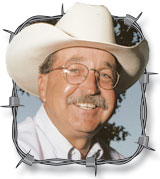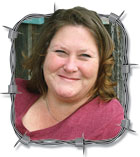Because I was born in 1952, I have no recollection of the severe drought and scorching temperatures of that year and the two that followed, but I heard my father talk about them until the day he died. Every time we’d experience a sustained dry spell or a few days of unusually high temperatures, dad would always say, “It’s bad, no doubt, but it’s nothing like the summer of 1954.”
Here in the summer of 2012, as I stare out across the brown and parched land that should at least contain a few shades of green, I long for a conversation with my dad to see if this summer is as bad. I’ve quit counting the number of days over 100 degrees and have tried to forget how long it has been since measurable rainfall. I fed range cubes for a couple of weeks before I decided to start feeding the winter storehouse of hay – in July. Surely, the rains will come this fall.
In that summer of 1952, dad had finally made the transition from farming with a team of horses to doing so with a new Ford tractor. To hear him tell the story, the only operations he got to perform with that tractor for those first three years were to plow and plant the fertile river bottom of the White River. There would be no corn harvest except the withered stalks that he would cut by hand and hauled the three miles to our upland farm where they were fed to the dozen milk cows that he and mom milked… by hand… twice daily. They and my oldest sister would process and bottle the milk to sell in town to keep the farm afloat. They had to do something; after all, they had a new tractor to pay off.
As I make the daily drive around my farms to check on the deteriorating conditions, I am keenly aware that my truck is, at least, air-conditioned. Dad’s wasn’t. I also realize that the tractor I use to place round bales out for the cows is also air-conditioned. The harvested cornstalks that dad fed to his cows were cut with a hand scythe, loaded onto a four-wheeled wagon, and hauled all those miles in the unrelenting sun and heat. And… there most certainly wasn’t a nice, cool house to come home to in order to get a respite from the brutal conditions. We didn’t even have electricity back then.
No, back then, there weren’t politicians clamoring for your vote by promising emergency farm loans. There was no crop insurance, disaster assistance or forgiving bankers. It was just a farmer against the elements.
Many times, dad had related to me that things got so bad, he would actually go out into the woods with the chainsaw and cut down a tree every day just so the small herd of beef cows would have something green to consume. According to his stories, by the end of that summer of ‘54, the cows would stampede toward the sound of the saw and he would have to cut it down fast, lest he be run over by the animals or have the tree fall on one as they waited for their next meager meal.
So, whenever I’m feeling sorry for myself and start thinking things could never have been this bad before or can’t get any worse, I can hear the words of my father telling me, “Buck up, son, this ain’t nearly as bad as 1954.” But, just to be on the safe side, I’d better go by the hardware store and get myself a new chain for my saw.
Jerry Crownover farms in Lawrence County. He is a former professor of Agriculture Education at Missouri State University, and is an author and professional speaker. To contact Jerry, go to ozarksfn.com and click on ‘Contact Us.’







